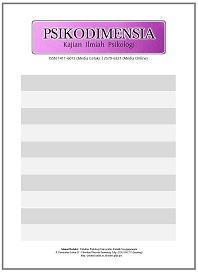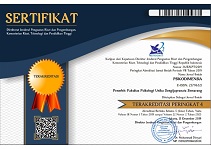Pengaruh Modal Psikologis terhadap Kesejahteraan Subjektif Karyawan Sales Start-Up di PT. X
Abstract
PT. X merupakan perusahaan start-up yang bergerak di bidang teknologi keuangan. Keberhasilan yang didapat tidak terlepas dari karyawan sales yang menjadi ujung tombak. Karyawan sales menunjukkan berbagai emosi mulai dari emosi positif sampai emosi yang Tidak sedikit pula yang puas atas kehidupannya dan bangga. Hal tersebut disebut sebagai kesejahteraan subjektif. Dalam mengerjakan tugasnya, karyawan sales memiliki keyakinan, mempunyai tujuan, dan merasa optimis akan hidupnya. Kondisi tersebut disebut sebagai modal psikologis. Dengan demikian, penelitian ini dilakukan untuk meneliti pengaruh modal psikologis terhadap kesejahteraan subjektif pada 271 karyawan sales yang bekerja di PT. X. Hipotesis pada penelitian ini adalah modal psikologis memiliki pengaruh secara signifikan terhadap kesejahteraan subjektif pada karyawan sales start-up di PT. X. Teknik sampling yang digunakan adalah convenience sampling. Alat ukur yang digunakan untuk mengukur kesejahteraan subjektif adalah Satisfaction With Life Scale yang dikembangkan oleh Diener dkk. (1985) dan The Positive and Negative Affect Schedule yang dikembangkan oleh Watson dan Clark (1988). Sedangkan untuk modal psikologis menggunakan Psychological Capital Questionnaire dari Luthans dkk. (2007). Hasil regresi menunjukkan bahwa modal psikologis berpengaruh secara signifikan terhadap kesejahteraan subjektif (β=0.630, F=176.779, t=13.296, p<0.05).
Keywords
Full Text:
PDF (Bahasa Indonesia)References
Annur (2022, Maret 23). Ada 204,7 juta pengguna internet di Indonesia awal 2022. Katadata.co.id. Dilihat dari https://databoks.katadata.co.id/datapublish/2022/03/23/ada-2047-juta-pengguna-internet-di-indonesia-awal-2022
Baidun, A., Shaleh, A., Miftahuddin, M., Luzvinda, L., & Muhtar, D. (2020). Effect of psychological capital and gratitude on subjective well-being young mother of hijrah communities in Jakarta. International Conference on Religion and Mental Health. doi:10.4108/eai.18-9-2019.2293
Bakker, A. B., Demerouti, E., & Sanz-Vergel, A. I. (2014). Burnout and work engagement: The JD–R approach. Annual Review of Organizational Psychology and Organizational Behavior, 1(1), 389–411. doi:10.1146/annurev-orgpsych-031413-091235
Bandura, A. (2012). On the functional properties of perceived self-efficacy revisited. Journal of Management, 38, 9-44.
Datu, J. A. D., & Valdez, J. P. M. (2016). Psychological capital predicts academic engagement and well-being in Filipino high school students. The Asia-Pacific Education Researcher, 25(3), 399-405.
Diener, E. D., Emmons, R. A., Larsen, R. J., & Griffin, S. (1985). The satisfaction with life scale. Journal of Personality Assessment, 49(1), 71-75.
Diener, E. (2009). Subjective well-being. The Science of Well-being, 11-58.
Diener, E. & Chan, M.Y. (2011). Happy people live longer: Subjective well-being contributes to health and longevity. Applied Psychology : Health and Well-Being, 3(1), 1-43. https://doi.org/10.1111/j.1758-0854.2010.01045.x
Diener, E., Pressman, S. D., Hunter, J., & Delgadillo‐Chase, D. (2017). If, why, and when subjective well‐being influences health, and future needed research. Applied Psychology: Health and Well‐Being, 9(2), 133-167. doi:10.1111/aphw.12090
Etikan, I., Musa, S. A., & Alkassim, R. S. (2016). Comparison of convenience sampling and purposive sampling. American Journal of Theoretical and Applied Statistics, 5(1), 1-4.
Gan, Y., & Cheng, L. (2021). Psychological capital and career commitment among chinese urban preschool teachers: The mediating and moderating effects of subjective well-being. Frontiers in Psychology, 12. https://doi.org/10.3389/fpsyg.2021.509107
Gilani, U., Karim, J., & Din, S. (2019). Psychological capital and career success: Mediating role of subjective well-being. Journal of Managerial Sciences, 13(4).
Hobfoll, S. E., Halbesleben, J., Neveu, J.-P., & Westman, M. (2018). Conservation of resources in the organizaational context: The reality of resources and their consequences. Annual Review of Organizational Psychology and Organizational Behavior, 5, 103–128.
Karimuddin, A. (2017, 24 Januari). Indonesia’s tech startup report 2016. DailySocial.id. Diunduh dari https://dailysocial.id/research/indonesias-tech-startup-report-2016
Kasi, P.M. (2009): Research: What, why and how? A treatise from researchers to researchers. Author House
Lavrakas, P. J. (2008). Encyclopedia of survey research methods (Vols. 1-0). Sage Publications, Inc. doi: 10.4135/9781412963947
Luthans, F., Youssef, C. M., & Avolio, B. J. (2007). Psychological capital: Developing the human competitive edge. Oxford University Press. https://doi.org/10.1093/acprof:oso/9780195187526.001.0001
Maulida, D., & Shaleh, A. R. (2017). Pengaruh modal psikologis dan totalitas kerja terhadap kesejahteraan subjektif. Psikohumaniora: Jurnal Penelitian Psikologi, 2(2),107–124.
Mulachela, H. (2021, 9 Agustus). Pengertian startup, istilah, dan bedanya dengan bisnis konvensional. Katadata.co.id. Diunduh dari https://katadata.co.id/safrezifitra/digital/6110a5251ff83/pengertian-startup-istilah-dan-bedanya-dengan-bisnis-konvensional
Newman, A., Ucbasaran, D., Zhu, F., & Hirst, G. (2014). Psychological capital: A review and synthesis. Journal of Organizational Behavior, 35(S1), S120–S138. doi:10.1002/job.1916
Ngui, G. K., & Lay, Y. F. The predicting roles of self-efficacy and emotional intelligence and the mediating role of resilience on subjective well-being: A PLS-SEM approach. Journal of Social Sciences & Humanities, 1, 1-25.
Paakkanen, M. A., Martela, F., & Pessi, A. B. (2021). Responding to positive emotions at work–The four steps and potential benefits of a validating response to coworkers’ positive experiences. Frontiers in Psychology, 45-53.
Parker, P. D., Ciarrochi, J., Heaven, P., Marshall, S., Sahdra, B., & Kiuru, N. (2015). Hope, friends, and subjective well‐being: A social network approach to peer group contextual effects. Child Development, 86(2), 642-650.
Paul, M., & Sahoo, K. (2017). Role of spirituality as a positive psycholocial capital tool in prediction of emotions and subjective well-being among management students. Riding the New Tides: Navigating the Future Through Effective People Management, 224-233.
Pleeging, E., Burger, M., & van Exel, J. (2021). The relations between hope and subjective well-being: A literature overview and empirical analysis. Applied Research in Quality of Life, 16(3), 1019-1041.
Rosenman, R., Tennekoon, V., & Hill, L. G. (2011). Measuring bias in self-reported data. International Journal of Behavioural & Healthcare Research, 2(4), 320–332. https://doi.org/10.1504/IJBHR.2011.043414
Russel, J. E. A. (2008). Promoting subjective-well being at work. Journal of Career Assessment, 16(1), 117-131. doi:10.1177/1069072707308142
Sahai, A., & Singh, A. (2017). A correlation study: The relationship between optimism and subjective well-being of education sector employees. Indian Journal of Positive Psychology, 8(3), 347-350.
Shaukat, R., Yousaf, A. & Sanders, K. (2017). Examining the linkages between relationship conflict, performance and turnover intentions: Role of job burnout as a mediator. International Journal of Confllict Management, 28(1), 4-23. https://doi.org/10.1108/ IJCMA-08-2015-0051
Sholikhah, M. (2020, 11 Januari). Strategi mengembangkan dan mempertahankan startup. Yoursay.id. Diunduh dari https://yoursay.suara.com/news/2020/01/11/193312/strategi-mengembangkan-dan-mempertahankan-startup
Srivastava, U. R., & Maurya, V. (2017). Organizational and individual level antecedents of psychological capital and its associated outcomes: Development of a conceptual framework. Management and Labour Studies, 42(3), 205–236. https://doi.org/10.1177/0258042X17718739
Wanberg, C. R., Csillag, B., Douglass, R. P., Zhou, L., & Pollard, M. S. (2020). Socioeconomic status and well-being during COVID-19: A resource-based examination. Journal of Applied Psychology, 105(12), 1382.
Wang, Y., Tsai, C. H., Tsai, F. S., Huang, W., & de la Cruz, S. M. (2018). Antecedent and consequences of psychological capital of enterpreneurs. Sustainability (Switzerland), 10(10). https://doi.org/10.3390/su10103717
Watson, D., Clark, L. A., & Tellegen, A. (1988). Development and validation of brief measures of positive and negative affect: The PANAS scales. Journal of Personality and Social Psychology, 54(6), 1063–1070. doi:10.1037/0022-3514.54.6.1063
DOI: https://doi.org/10.24167/psidim.v21i2.4649
Print ISSN : 1411-6073 | online ISSN : 2579-6321 View My Stats

This work is licensed under a Creative Commons Attribution 4.0 International License.




















